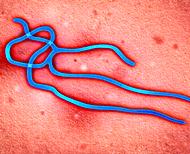Ebola: At home and abroad
The world is experiencing the largest Ebola outbreak in history. It’s centered in West Africa, primarily in Guinea, Liberia and Sierra Leone. International travel, and efforts by volunteer health professionals to contain the outbreak, means that Ebola is now affecting many countries, including the United States.
Ebola is a terrible disease, and at present, there is no certain cure. In West Africa, half the people who have been infected have died.
But Ebola is not easily spread, like the flu or a cold, through air or by limited contact with someone who has the disease. To become infected with Ebola, a person must have direct contact with the body fluids of an individual who has been diagnosed with Ebola, or has been exposed and is suffering symptoms of the virus.
It’s not surprising that widespread fear surrounds Ebola, even in the U.S., where the risk of becoming infected is minuscule. Fear of Ebola is causing panic and stigmatization of Africans and African-Americans of all ages, and is particularly serious for schoolchildren who have African roots. AFT educators report bullying of African students, even physical attacks by their frightened peers. Parents, uneducated about Ebola, have kept their children from going to school in some communities, fearful that they will be infected.
The truth is that healthcare workers—not schoolchildren or average Americans—are at the greatest risk of contracting Ebola if they either treat patients who have it or screen suspect cases. After stumbling early on, the Centers for Disease Control and Prevention, the Occupational Safety and Health Administration and other agencies have released guidance to protect healthcare workers. Leaders and members of the AFT Nurses and Health Professionals division are working with state health departments, their hospitals and other healthcare facilities to make sure that our members are prepared and protected to deal with a case of Ebola.
The World Health Organization, and medical relief agencies treating Ebola patients, all agree that the key to limiting the spread of the disease and reducing the death rate from it is to have more skilled medical personnel working in West Africa. One New Jersey nurse, a member of the AFT-affiliated Health Professionals and Allied Employees, recently left to volunteer in West Africa. Others are likely to follow. AFT health professionals here are working to make sure their colleagues come back safely, and that they receive a heroes’ welcome when they return.
Whether it’s educating students and their parents about the real risks of Ebola, protecting themselves and their communities against the virus and the panic it has caused, or volunteering in West Africa, AFT members are working at every level to contain the Ebola crisis before it destroys more lives here and abroad.

